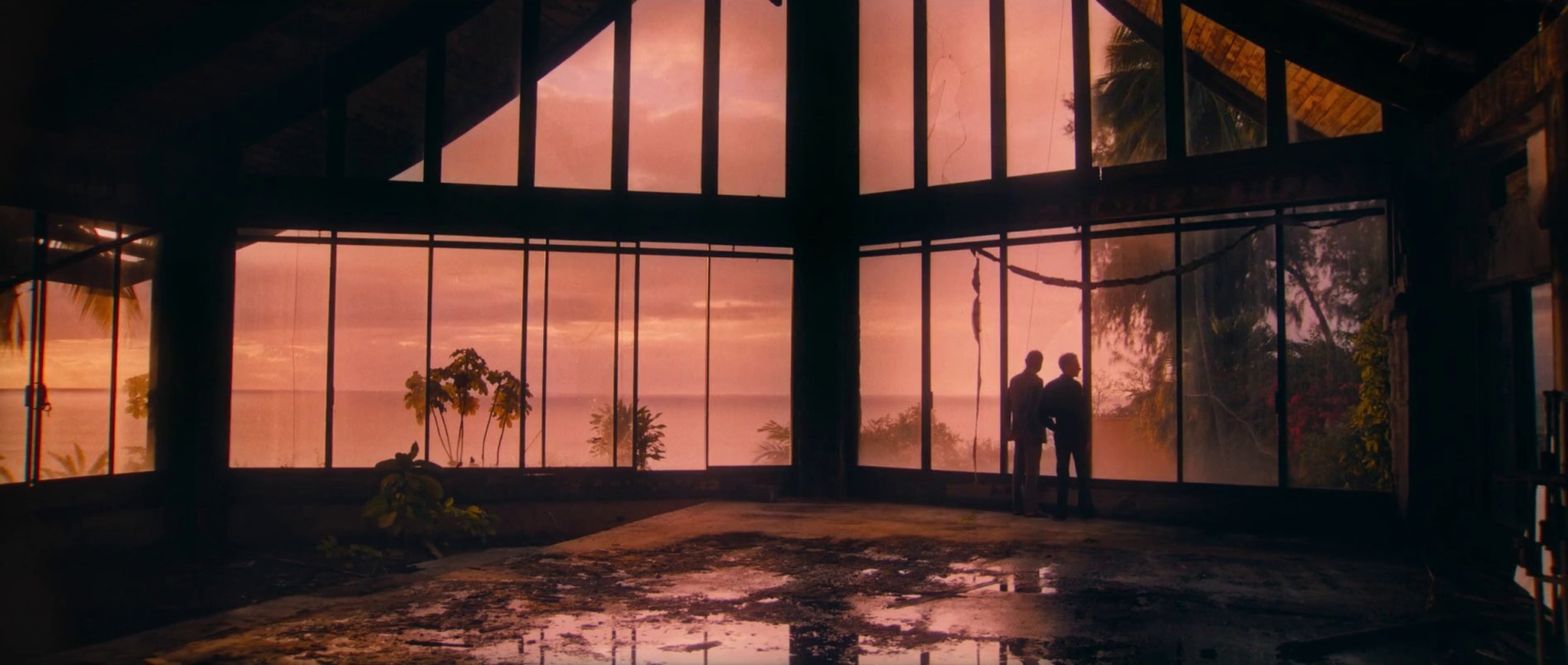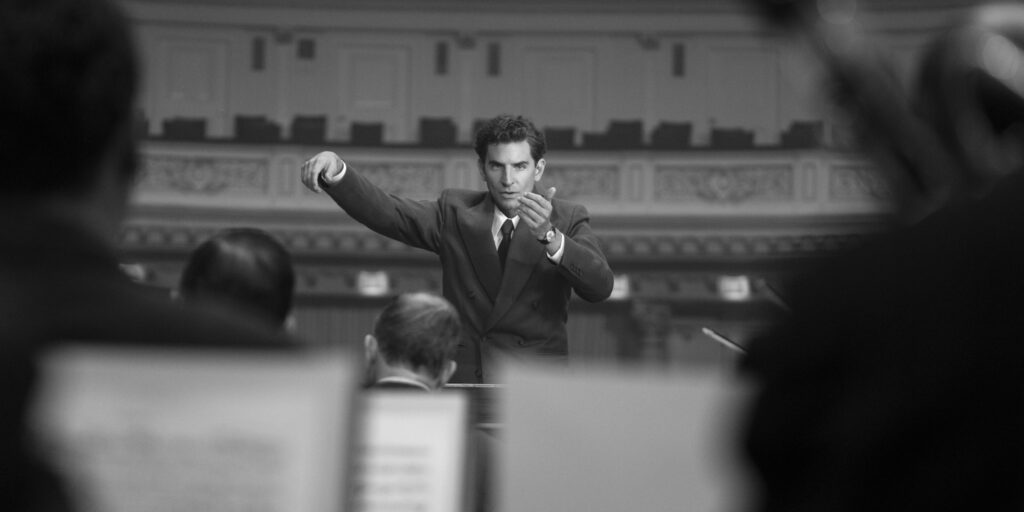Set primarily on the island of Tahiti in the collectivité d’outre-mer of French Polynesia, director Albert Serra’s Pacifiction is replete with images of mesmerizing natural beauty. Every wide shot seems to glow with the warm, rainbow hues of a Paul Gauguin painting – particularly at dawn and twilight, when the sky flaunts preposterous gradients of gold, coral, and purple. However, the opening shot of the feature is not an image of wild splendor, but of industrial monumentalism. Recalling Maya Da-Rin’s similarly hypnagogic equatorial portrait, A Fever (2019), Serra’s film pans languidly across a massive maritime freight terminal, where thousands of shipping containers sit stacked, awaiting their final destinations. Combined with a sound design that emphasizes the port’s eerie, perpetual background hum, the shot conveys the uncanniness of humankind’s drastic, estranging reconfiguration of the tropical landscape. Notwithstanding the kitschy tiki bars that cynically capitalize on a fantasy of Edenic island beauty, global industrialization is relentlessly supplanting Tahiti’s natural resplendence with steel and concrete.
It is a fitting sensory prologue to a film that is, in part, about the grinding remorselessness of neocolonial expansion and the futility of attempting to stand upright in the ceaseless, pounding waves of what Paddy Chayefsky vividly described as that “vast and immane dominion.” Our window into this world is one De Roller (Benoît Magimel), the current high commissioner of French Polynesia, and thus the French Republic’s key representative on the islands. In his tinted sunglasses, cream-colored blazer, and sockless slip-ons, De Roller gives the instant impression of a world-weary colonial legate. Here is a man who knows everyone and has seen everything. Early in the film, he takes a breakfast meeting at his official residence with a group of Polynesian leaders and activists. They discuss recent rumors of a possible resumption of nuclear tests on the islands, a decades-long source of friction between the locals and the French government. De Roller expresses his opposition to such tests, but his sympathy is couched in the smooth-talking evasiveness of a lifelong political operator. He furrows his brow and purses his lips intently as a tattooed elder voices his concerns, but it feels like a performance, a pretense of intercultural rapport.
One of the primary fascinations of Pacifiction lies in watching Serra (The Death of Louis XIV, Liberté) variously confirm, complicate, and deconstruct our suspicions that De Roller is a self-interested political creature at heart. The commissioner certainly has an impressive diplomatic savviness about him. He keeps a watchful eye on the comings and goings at a boutique hotel in Papeete – where he seems to have a financial stake of some sort – and lounges in nightspots favored by foreign visitors, pounding Mai Tais and playing the part of the veteran chargé d’affaires. His attention of late is fixated on a jingoistic French admiral (Marc Susini) who comes ashore every evening with a cadre of sailors to enjoy the island’s earthly delights. Is the Navy’s presence connected to the alleged atomic tests? Also of interest to De Roller is a suspicious Portuguese newcomer (Alexandre Melo), whose travel-document mishaps and alcoholic overindulgence he leverages to pump the man for information.
To an outside observer, it might seem peculiar that the Republic’s chief envoy in French Polynesia would need to resort to such skullduggery to obtain intelligence about his own government’s agenda. However, this is a telltale sign that De Roller, despite his facility for geopolitical intrigue, is little more than a figurehead in the prevailing new world order. He seems to sense his growing uselessness, grumbling bitterly but vaguely of an impending withdrawal from politics. To that end, he begins courting one of the hotel’s Polynesian employees, Shannah (Pahoa Mahagafanau), to serve as a replacement for his questionably loyal aide and as his de facto proxy in a future where his official role has been curtailed. Charmingly shy yet keen-eyed, Shannah is flattered by De Roller’s vocal confidence in her latent talent for subtle statecraft. However, he is still a White colonizer: His conspicuous open-mindedness about her trans identity may be a mask for a darker fetishization, and his drunken, apocalyptic ramblings about the island’s grim future disquiet her.
Pacifiction is dense with subplots and digressions, such as a conflict with the Catholic Church over a casino opening, the fêting of a self-important French author, and De Roller’s micromanagement of a traditional Polynesian dance revue. (The commissioner’s colonial condescension never feels more pronounced than when he insists that the performers add a more violent edge to their ritualized cockfighting pantomime.) Ultimately, however, Serra’s feature is not especially interested in the procedural minutiae of De Roller’s position, or in clarifying or resolving the film’s many narrative strands. Tellingly, De Roller’s efforts to get to the bottom of the nuclear-test rumors never amount to anything, notwithstanding the eccentric measures he and his allies employ. A nocturnal offshore search for an elusive Navy vessel – or the boatload of Tahitian prostitutes who allegedly shuttle back and forth to it – concludes in empty-handed frustration.
In lieu of labyrinthine intrigue, Pacifiction is concerned foremost with conveying a malarial haze of futility and disillusionment. Others might see De Roller as a mere cog in the neocolonial juggernaut, but even that would imply a functionality that the commissioner has not possessed in many years (if he ever did). Much of the film’s action, such as it is, consists of De Roller restively wandering between the same locales, visibly indecisive about what exactly he should be doing. He is cursed to see the chess moves unfolding around him but powerless to do anything about them – a bitterly ironic situation epitomized by the cold-blooded, weaselly CIA agent who haunts his steps but doesn’t bother to conceal his presence. In a rare moment of nervy truth-telling, De Roller calls out a Native activist (Matahi Pambrun) for allowing himself to be used as a cat’s paw by Russian, Chinese, and American schemers. However, the commissioner can only whisper his scathing disapproval in the man’s ear. In the new, more vulgar and globalized empire, De Roller is little more than a faltering shade in a sweat-stained linen suit.
Crucially, Serra isn’t asking the viewer to shed a tear over the commissioner’s existential crisis, but he does challenge us to steep in his narcotic, sweltering restlessness for 165 unhurried minutes. That may be more than some viewers are willing to tolerate, admittedly. Pacifiction isn’t quite slow cinema, but it is vibes cinema, luxuriating at length in cinematographer Artur Tort’s stunning images of mist-clad mountains, azure waves, and unbearably pink sunsets. Yet he and Serra are just as absorbed with the cold, faintly surreal beauty of their setting’s human-made landscapes. In a key sequence, De Roller confounds his CIA shadow by strolling aimlessly across an empty athletic field during an early evening rainstorm. As Magimel closes his eyes and lifts face to the sky underneath the buzzing artificial lighting, it feels as vivid and eerie as any comparable sequence of forlorn masculinity in The Insider (1999) or Miami Vice (2006).
A similar sensation of somber, desultory motion pervades one of Pacifiction’s final scenes, in which a spiritually defeated De Roller wanders onto a mostly vacant nightclub dance floor, awash in greasy violet light. Here Serra evokes no less a film than Claire Denis’ Beau Travail (1999), another feature concerned in part with French identity and its entanglement with an increasingly irrelevant imperial apparatus. Where Denis Lavant’s tortured Foreign Legion officer famously cut loose to Corona’s “The Rhythm of the Night” in that film’s epilogue, here the commissioner just shuffles weakly in slump-shouldered dejection as a rumbling trance beat pounds away. Allies and enemies alike stare at this awkward display with mingled confusion and embarrassment: Here, at last, De Roller lets the mask of calculated cynicism slip, revealing a lost man who has no idea what he is doing or why.
Pacifiction screens nightly at 7 p.m. on March 3 – 5 at the Webster University Film Series.




